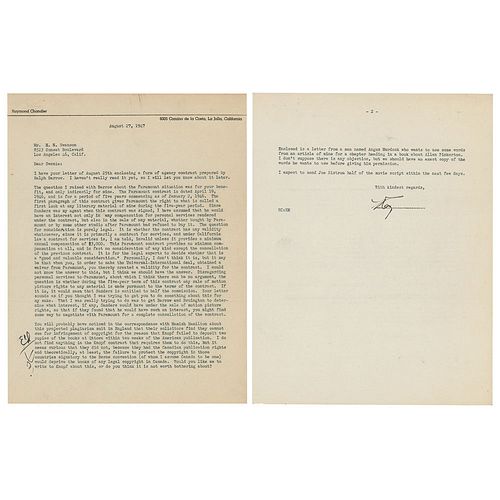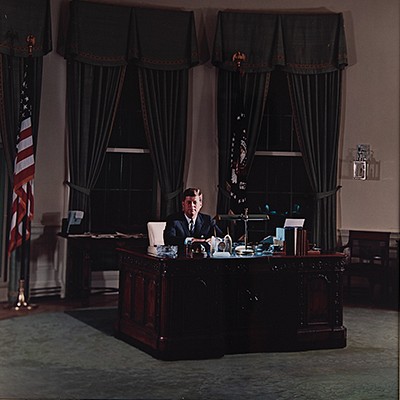Raymond Chandler Typed Letter Signed
Two ways to bid:
- Leave a max absentee bid and the platform will bid on your behalf up to your maximum bid during the live auction.
- Bid live during the auction and your bids will be submitted real-time to the auctioneer.
Bid Increments
| Price | Bid Increment |
|---|---|
| $0 | $5 |
| $50 | $10 |
| $200 | $25 |
| $500 | $50 |
About Auction
Nov 8, 2023
RR Auction's November Fine Autographs and Artifacts auction offers an extraordinary and wide-ranging selection of the rare and remarkable. RR Auction support@rrauction.com
- Lot Description
TLS signed “Ray,” two pages, 8.5 x 11, August 27, 1947. Letter to “Swanie,” his literary agent H. N. Swanson, in full: “I have your letter of August 25th enclosing a form of agency contract prepared by Ralph Barrow. I haven't really read it yet, so I will let you know about it later.
The question I raised with Barrow about the Paramount situation was for your benefit, and only indirectly for mine. The Paramount contract is dated April 19, 1946, and is for a period of five years commencing as of January 2, 1946. The first paragraph of this contract gives Paramount the right to what is called a first look at any literary material of mine during the five-year period. Since Sanders was my agent when this contract was signed, I have assumed that he would have an interest not only in any compensation for personal services rendered under the contract, but also in the sale of any material, whether bought by Paramount or by some other studio after Paramount had refused to buy it. The question for consideration is purely legal. It is whether the contract has any validity whatsoever, since it is primarily a contract for services, and under California law a contract for services is, I am told, invalid unless it provides a minimum annual compensation of $3,000. This Paramount contract provides no minimum compensation at all, and in fact no consideration of any kind except the cancellation of the previous contract. It is for the legal experts to decide whether that is a ‘good and valuable consideration. Personally, I don't think it is, but it may be that when you, in order to make the Universal-International deal, obtained a waiver from Paramount, you thereby created a validity for the contract. I would not know the answer to this, but I think we should have the answer. Disregarding personal services to Paramount, about which I think there can be no argument, the question is whether during the five-year term of this contract any sale of motion picture rights to any material is made pursuant to the terms of the contract. If it is, it would seem that Sanders is entitled to half the commission. Your letter sounds as if you thought I was trying to get you to do something about this for my sake. What I was really trying to do was to get Barrow and Bruington to determine what interest, if any, Sanders would have under the sale of motion picture rights, so that if they found that he would have such an interest, you might find some way to negotiate with Paramount for a complete cancellation of the contract.
You will probably have noticed in the correspondence with Hamish Hamilton about this projected plagiarism suit in England that their solicitors find they cannot sue for infringement of copyright for the reason that Knopf failed to deposit two copies of the books at Qttowa within two weeks of the American publication. I do not find anything in the Knopf contract that requires them to do this, but it seems curious that they did not, because they had the Canadian publication rights and theoretically, at least, the failure to protect the copyright in those countries signatory to the Berne convention (of whom I assume Canada to be one) would deprive the books of any legal copyright in Canada. Would you like me to write to Knopf about this, or do you think it is not worth bothering about?
Enclosed is a letter from a man named Angus Murdock who wants to use some words from an article of mine for a chapter heading in a book about Allan Pinkerton. I don't suppose there is any objection, but we should have an exact copy of the words he wants to use before giving him permission. I expect to send Joe Sistrom half of the movie script within the next few days.” In fine condition, with staple holes to the upper left corner. - Shipping Info
-
Bidder is liable for shipping and handling and providing accurate information as to shipping or delivery locations and arranging for such. RR Auction is unable to combine purchases from other auctions or affiliates into one package for shipping purposes. Lots won will be shipped in a commercially reasonable time after payment in good funds for the merchandise and the shipping fees are received or credit extended, except when third-party shipment occurs. Bidder agrees that service and handling charges related to shipping items which are not pre-paid may be charged to a credit card on file with RR Auction. Successful international Bidders shall provide written shipping instructions, including specified Customs declarations, to RR Auction for any lots to be delivered outside of the United States. NOTE: Declaration value shall be the item’(s) hammer price and RR Auction shall use the correct harmonized code for the lot. Domestic Bidders on lots designated for third-party shipment must designate the common carrier, accept risk of loss, and prepay shipping costs.
-
- Buyer's Premium



 EUR
EUR CAD
CAD AUD
AUD GBP
GBP MXN
MXN HKD
HKD CNY
CNY MYR
MYR SEK
SEK SGD
SGD CHF
CHF THB
THB



